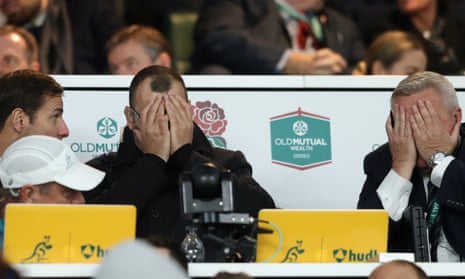1) England hard to beat but remain a work in progress
England will finish the year on a winning note unless Samoa, vanquished by Romania in Bucharest on Saturday, produce the result of the decade. Unbeaten in their first year under Eddie Jones, they have lost only against Ireland in 2017 without, Scotland at home apart, producing an entirely compelling performance. Jones will not mind, counting down as he is to the 2019 World Cup; he is completing a jigsaw puzzle, adding pieces each game. Against Argentina, England were largely on the front foot, building patiently, if unspectacularly, almost rigid in their approach. On Saturday, they played more off the back foot, absorbing pressure and feeding off mistakes. Performances should be looked at collectively rather than in isolation: in the past two weeks England have shown defensive resilience and opportunism in attack, buoyed against Australia by the return of Maro Itoje, a multi-faceted player whose decision‑making is invariably spot-on. He had been on the field only a few seconds when he spotted a run by Kurtley Beale and hauled down the full‑back before he had got into his stride. For all their strength in depth they have no one to match him.
2) Australia fall foul of ambiguous TMO system
Australia were left to reflect on a performance which they were unfortunate to be behind in after 71 minutes but ended in a record defeat against England. Their head coach, Michael Cheika, had said before the game the Wallabies had developed a “no excuses” culture but after his team had fallen on the wrong side of every review by the television match official, he questioned the workings of a system that all too often adds ambiguity rather than clarity. If the yellow card shown to Beale for a deliberate knock-on seemed harsh, given that he had a try-scoring opportunity, and should have been reviewed, the three tries that were adjudicated resulted in the correct application of the law. In the case of Michael Hooper’s non-try, it is debatable whether the spirit of the law was satisfied. Originally in an offside position when Tevita Kuridrani kicked ahead, he held back and was behind Marika Koroibete when the wing played the ball with his shin. He had to be within an imaginary 10-metre line, but that was not part of the review, merely where he had been when Kuridrani kicked ahead.
3) Gap closing on previously unbeatable New Zealand
A year after Ireland defeated New Zealand for the first time, Scotland were within one pass of emulating them. When Stuart Hogg realised Beauden Barrett was going to prevent him from reaching the line in the dying minutes, he tried to pass over his right shoulder but, making his decision too late, the ball went forward and the All Blacks, who had been outplayed for long periods of the match, held on. In years past New Zealand have tended to pack the team at Murrayfield with reserve players but, in homage to the home side’s revival, they were close to full strength and won because they finished most of the opportunities they created. It proved the difference as Scotland, for all their ambition and ability to last the course, too often faltered at the moment of reckoning. They can, though, take much from defeat, forcing the leading team in the world to dig deep and deeper.
4) France slide while South Africa achieve redemption
South Africa held on to win the battle of the former heavyweights in Paris, but a few hours after Eddie Jones had pounced on a questioner who had asked whether England had been lucky that all the reviews at Twickenham went their way, what turned out to be the decisive score for the Springboks came after a forward pass from Eben Etzebeth to Jesse Kriel. It was judged on review to have been legitimate because the ball had been dislodged from the second row’s hands, an act that nine times out of 10 results in the ball being deemed to have gone forward. Not that South Africa care after the 38-3 defeat in Dublin the previous week but this was a match between two teams stripped of self-belief, powerhouses of the game who have lost their might. At the end of a week in which France won the right to host the 2023 World Cup, Guy Novès lost the 13th of his 20 matches in charge of the national side. Japan in a new stadium in Nanterre at the weekend is far from a foregone conclusion.
5) Second tier on the rise but Wales find way to hold on
Fiji were within a penalty of drawing in Ireland and Georgia, denied contested scrums at the end, were a converted try away from a tie in Wales. Fiji recovered from 17-3 down to pull back to 20-20 before being sunk by a late penalty and Georgia were 10 points down in Cardiff after 20 minutes. Ireland and Wales were both below strength, which says something about their narrow victories. The match in Cardiff ended with uncontested scrums after the Wales tighthead prop Tomas Francis was sent to the sin-bin and the player he had replaced, Leon Brown, was deemed unfit to return to the field. Georgia were on the attack and had to go for a lineout after a penalty rather than their preferred option of a scrum. Wales said there had been no gamesmanship, but that was not their stance at the end of the Six Nations when they accused France of pulling a front-row stunt at the end of the game, a claim that was reviewed by the tournament organisers who ruled that the evidence was inconclusive. Wales face Georgia in the 2019 World Cup. Will World Rugby have put a deterrent sanction in place by then?

Comments (…)
Sign in or create your Guardian account to join the discussion